| BrianRxm | Coins in Movies | 362/418 |
| The Thief of Bagdad (1940) |
An Arabian Nights fantasy with a dog who can tell a good coin from a bad coin
| Prev | Back | Next |
The 1940 film "The Thief of Bagdad" is an Arabian Nights fantasy film based on stories from the
"One Thousand and One Nights." A dog who can detect false coins appears in the film.
The story is set in Baghdad and Basra, two cities now located in modern Iraq.
The film uses "Bagdad", an alternate spelling of the city of Baghdad.
The prince in the story is identified as being a grandson of Harun al-Rashid, the real sultan
of the Abbasid Empire (AD 786-809) which would set the story in the period AD 800 to 900.
Harun al-Rashid was the king or sultan of the "Arabian Nights."
Prince Ahmad, the sultan of Baghdad, is tricked into prison by his Jaffar, his Grand Vizier or chief
minister, who is also a magician or sorcerer. There he meets Abu, a boy thief, the two escape and
encounter many adventures until they can remove Jaffar and restore Ahmad to his throne.
Along the way Ahmad meets and falls in love with a beautiful princess and Abu releases a genie and steals
a temple jewel.
Early in the film, Ahmad, blinded by Jaffar's magic, is a beggar in Baghdad's market.
He is accompanied by a dog who barks when a merchant gives him a "bad" or counterfeit coin.
The merchant is surprised that a dog can tell a good coin from a bad coin.
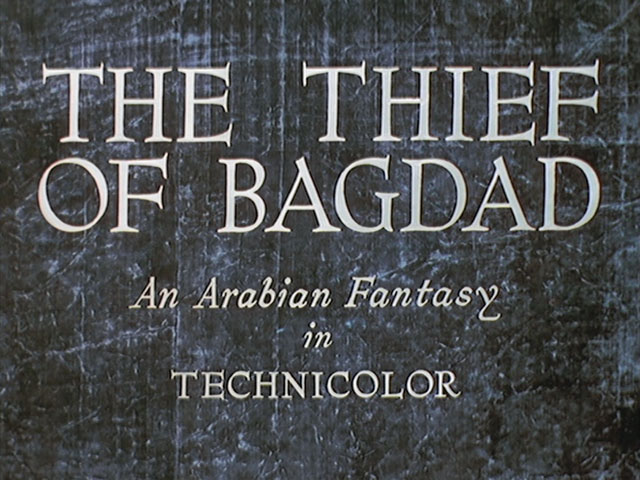
1. Title
In the Baghdad market a blind beggar accompanied by a dog is asking for alms.
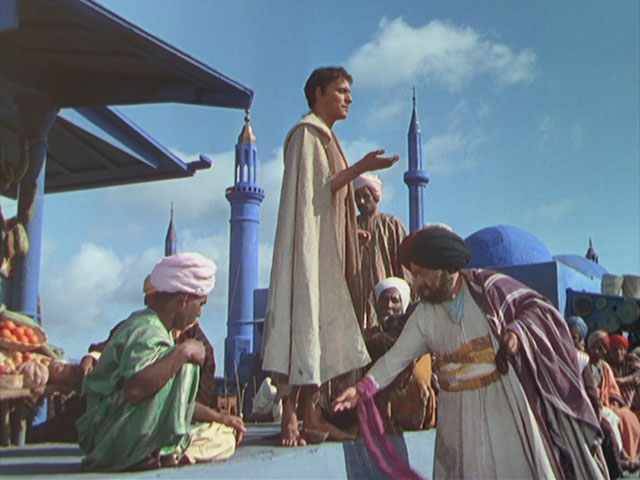
2. The blind beggar
A merchant puts a coin in the beggar's bowl and the dog barks.
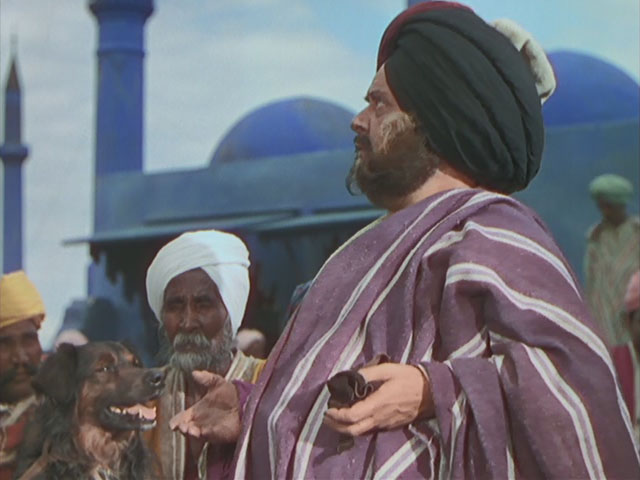
3. The dog rejects the coin
The merchant exclaims "What? Your cur would bark? A fine reward for charity."
The beggar replies: "If charity be false as that coin then you cheat."
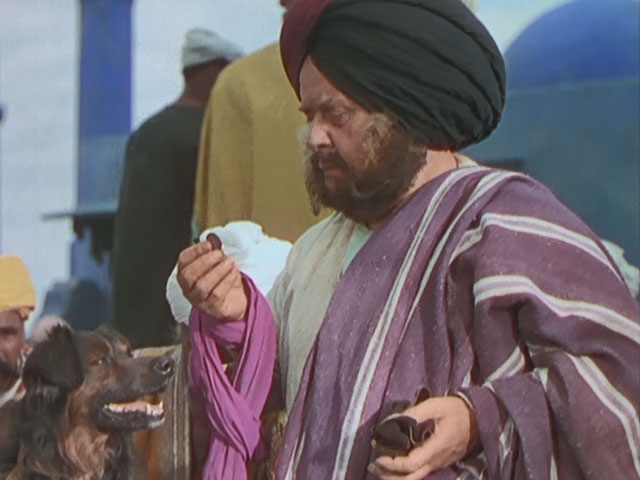
4. Can a dog tell a bad coin?
The merchant asks if the dog can tell a bad coin from a good coin and the beggar invites him to
test the dog. The merchant drops a bunch of coins in front of the dog who signals one coin which the
merchant picks up and bites it.
Biting a coin was an old method of testing gold coins but the coin here appears to be copper.
The merchant senses that the coin isn't "right" and looks at it, exclaiming "It is a false coin!."
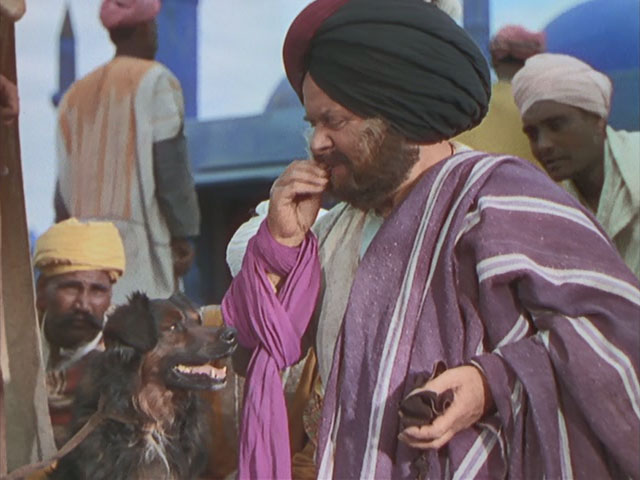
5. It is a false coin
The merchant then exclaims that "This is no dog, but the reincarnation of a tax collector."
A procession sent by Jaffar appears.
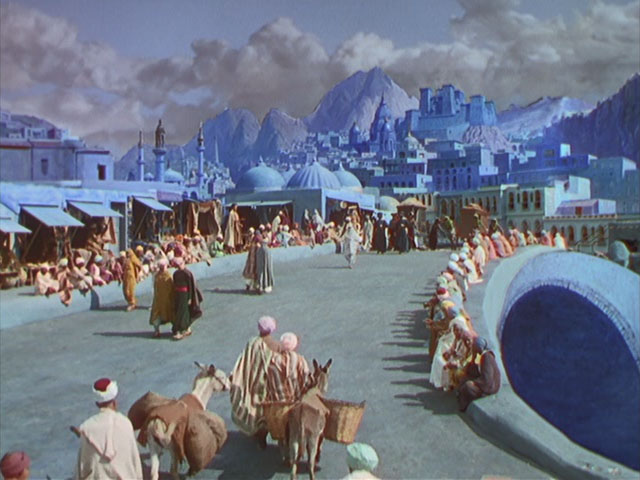
6. Baghdad procession
A woman in a coach invites the beggar to come to the palace which he accepts.
He is taken to the harem where he tells his story.
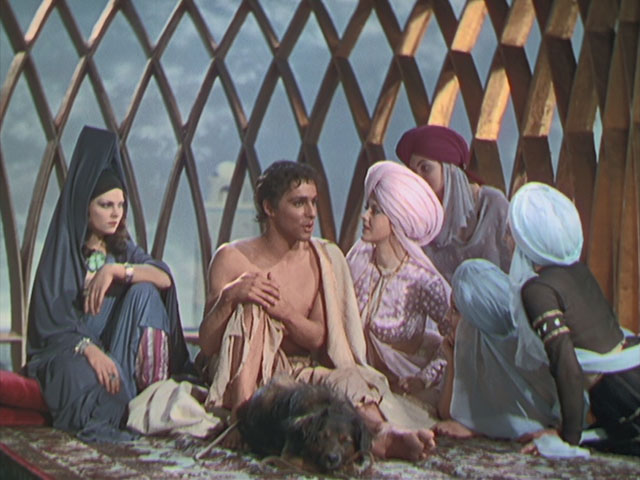
7. Ahmad tells his story to the harem
The beggar was once:
Ahmad the king, son of Akbar, grandson of Harun al-Rashid the Great,
the illustrious lord of the Earth, defender of the faith, servant of the all-highest,
but master of all men.
A coin of Harun al-Rashid:
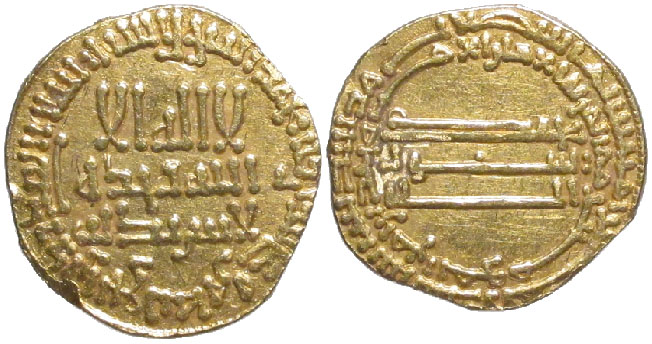
8. Abbasid Dinar, Harun al-Rashid, AD 802 (AH 186)
Gold, 19 mm, 4.02 gm
Harun al-Rashid AD 786-809 Mint: Baghdad (Madinat Al Salam, no mint mark)
Harun al-Rashid AD 786-809 Mint: Baghdad (Madinat Al Salam, no mint mark)
Back to the film:
As Ahmad tells his story the scene shifts back to when Ahmad was the king of Baghdad.
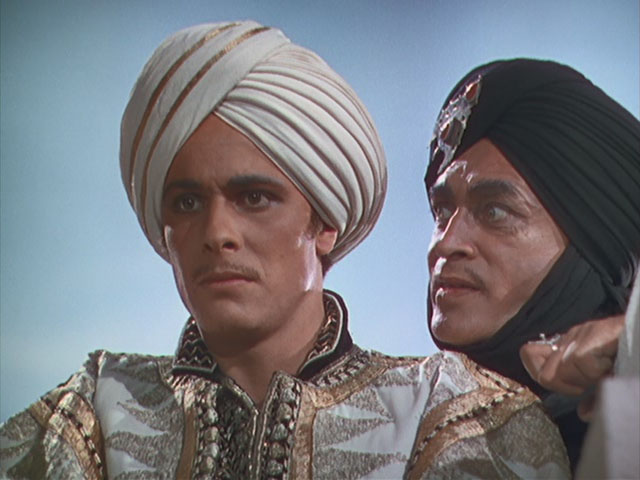
9. Ahmad and Jaffar
Jaffar, Ahmad's Grand Vizier, is actually running the country as a dictator, and, using a trick,
has Ahmed arrested and thrown into a dungeon. Ahmed meets Abu who is a boy who has been
arrested for stealing and both are sentenced to be executed in the morning.
Abu manages to steal a jailer's key and free both who then steal a boat and head to Basra.
The sultan of Basra is an old man whose daughter is a famously beautiful princess who
no man is allowed to look at.
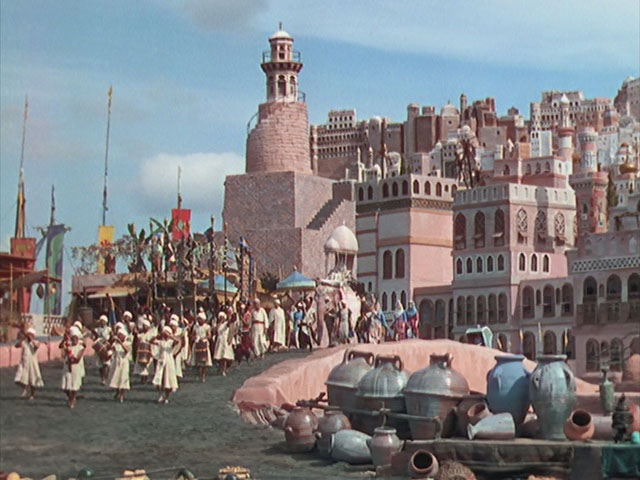
10. The princess comes to town
Both secretly watch the princess riding an elephant and Ahmad is lovestruck.
He climbs a wall into the palace, meets the princess, and both instantly fall in love.
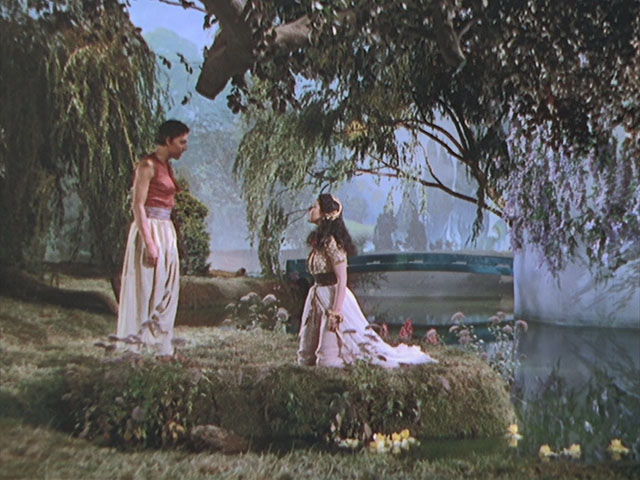
11. Ahmad meets the princess
Jaffar, now the sultan of Baghdad, is visiting Basra.
The sultan of Basra has a collection of toys and Jaffar gives him a mechanical horse.
The sultan asks Jaffar if he wants anything and Jaffar replies that he would like to marry the princess.
Jaffar describes her and when asked by the sultan how he knows what she looks like,
he tells the sultan that he has watched her many times in his "crystal."
The princess learns of the marriage plans and runs away to stay with her sister in Samarkand.
Ahmad and Abu turn up in the palace, are captured, and Jaffar, using his magical arts,
blinds Ahmad and turns Abu into a dog.
The princess is captured and brought back to the palace where she falls into a deep sleep.
Ahmad's story ends here; he is taken to the bed of the princess and embraces her, waking her up.
Jaffar takes the princess to a ship, while on board he tells her that by embracing him,
the spell on Ahmad will be broken and that he will see again. She does and at the market,
Ahmad recovers his sight and Abu is a boy again.
Ahmad and Abu take a boat to pursue Jaffar but Jaffar conjures a storm which wrecks their boat.
Jaffar and the princess return to Basra and she begs her father not to force her to marry him.
Jaffar has another gift for the sultan, the "Silver Maid."
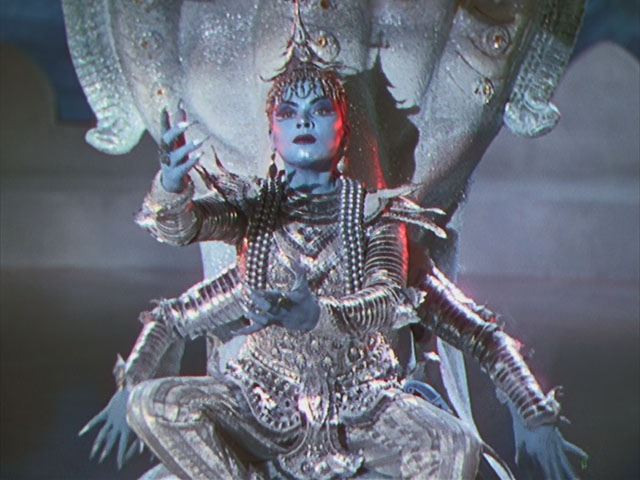
12. The Silver Maid
Jaffar tells the sultan that "Her embrace will thrill you as no other woman ever has or ever will."
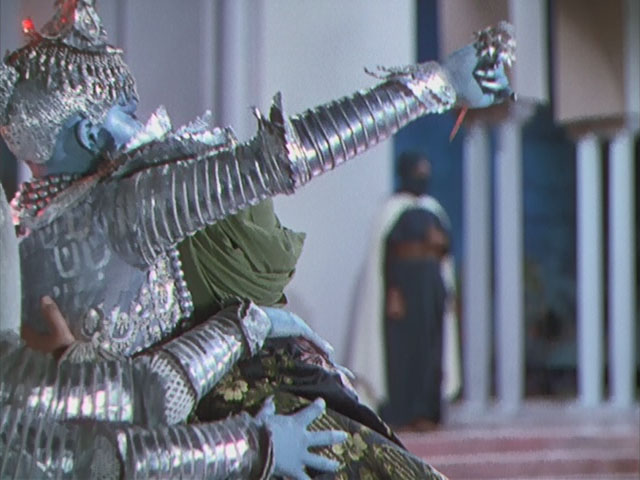
13. Embracing the sultan
Abu washes up on a shore and finds a large bottle.
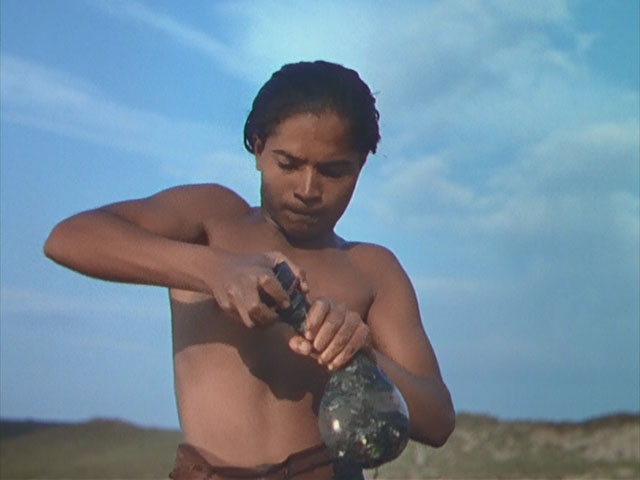
14. Abu uncorks the bottle
He uncorks the bottle, not always a good idea in these stories, and a huge genie or Djinn apppears.
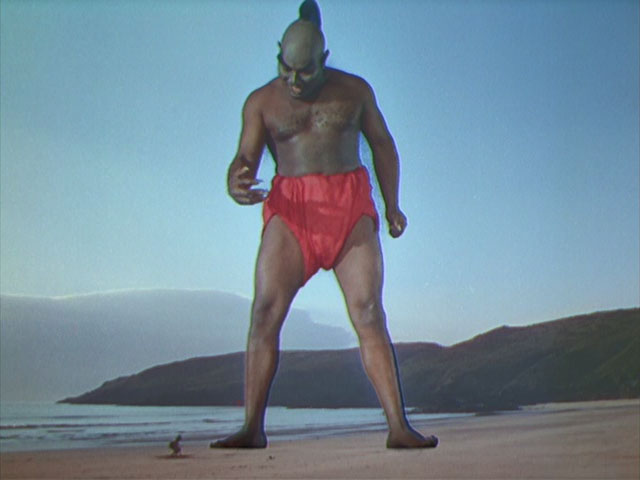
15. The Djinn appears
The Djinn then tells Abu what he plans to do.
Free again! Free, after 2,000 years.
2,000 years ago, King Solomon, Master of all the Djinn, imprisoned me within that bottle.
For me, this is the first moment of my new freedom.
For you, for you, this is the last moment of your life.
In a moment, I shall lift my foot and crush you,
Abu asks him:
But, sheik of spirits,
I fished you out of the sea!
I opened your bottle. I let you out.
You can't be so ungrateful.
And the Djinn replies:
Ungrateful? Slaves are not grateful, not when they have freedom.
Listen, inside my bottle for the first one thousand years,
I swore that I'd enrich the one that freed me with all the riches of the earth.
But in the second thousand years, my imprisoned spirit turned to vengeance
on all that lived and were free and I swore that I'd kill him that freed me to satisfy that hate.
Abu then tricks the Djinn into reentering the bottle.
The Djinn then promises Abu three wishes if he lets him out.
Abu asks him to take him to Ahmad but the Djinn tells him that to locate Ahmad he must steal the
All-Seeing Eye to find him.
The Djinn offers to take Abu to the location of the Eye in a temple far away.
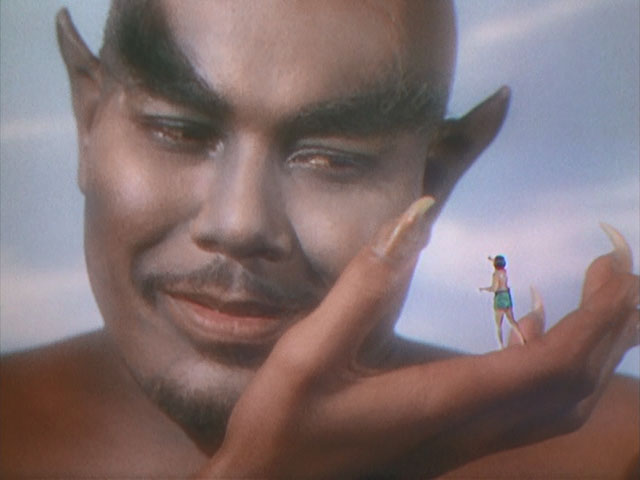
16. The Djinn explains the All-Seeing Eye
Above the roof of the world. (Has the world got a roof?)
Of course. Supported by 7 pillars, and the 7 pillars are set on the shoulders of a genie
Whose strength is beyond thought.
And the genie stands on an eagle, and the eagle on a bull, and the bull on a fish,
And the fish swims in the sea of eternity.
On the highest peak of the highest mountain of the world, where earth meets the sky.
And there is the Temple of the Dawn
And in the great hall of the temple is the Goddess of Light.
And in the head of the goddess is the all-seeing eye.
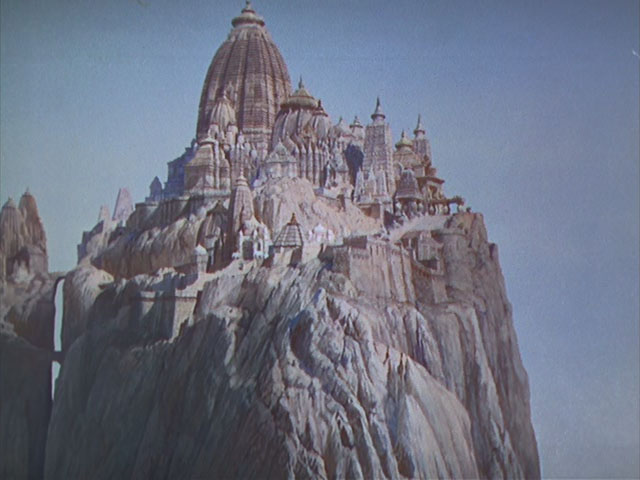
17. The Temple of the Dawn
The Djinn drops Abu off at the temple door.
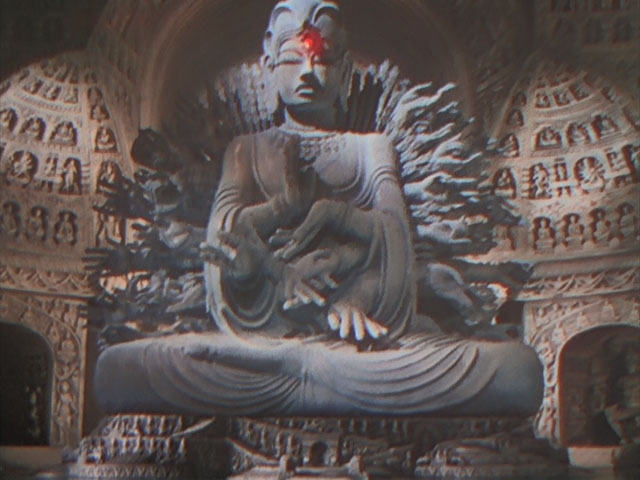
18. The Goddess and the Eye
There are green people living in the temple and they "direct" Abu into the web of a giant spider.
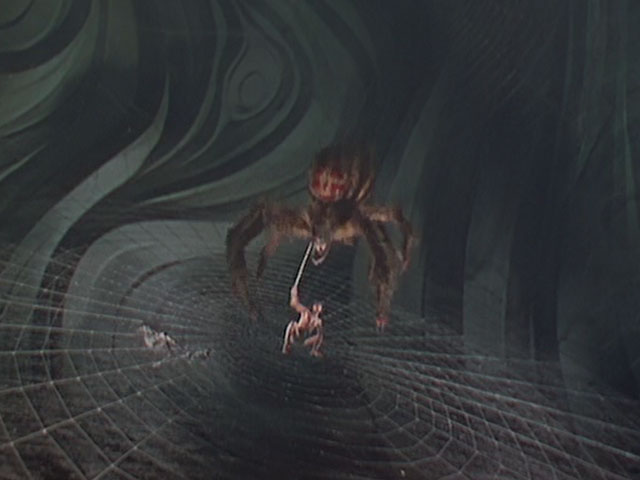
19. Abu in the web
Abu kills the spider and then climbs the statue to the Eye.
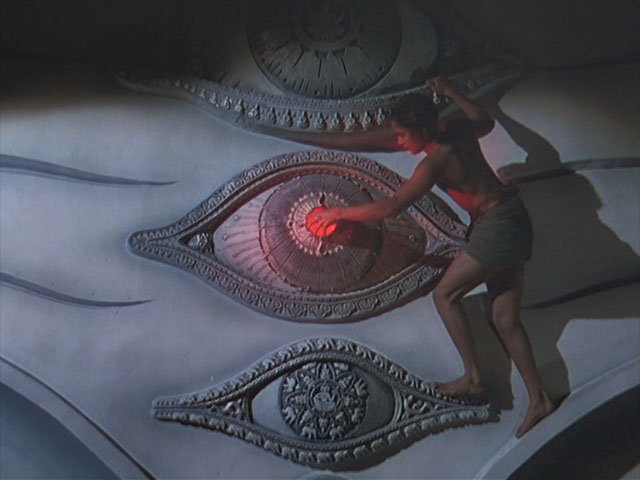
20. Abu stealing the All-Seeing Eye
The All-Seeing Eye is well known in occult lore as evidenced by this popular coin:
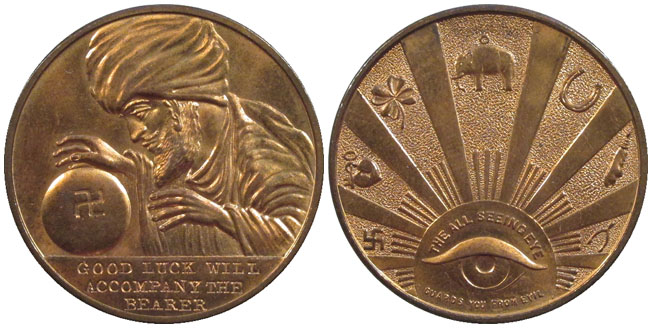
21. The Swami All-Seeing Eye Good Luck Coin
Bronze, 32 mm, 11.85 gm
Obverse:
"Swami" or fortune teller wearing turban and gazing into crystal ball.
Swastika appears on crystal ball.
GOOD LUCK WILL ACCOMPANY THE BEARER
Reverse:
Good luck symbols
Swastika, Heart-Key-Lock, Four-Leaf Clover, Elephant, Horseshoe, Rabbit's Foot, Wishbone
All-Seeing Eye below
THE ALL SEEING EYE / GUARDS YOU FROM EVIL
"Swami" or fortune teller wearing turban and gazing into crystal ball.
Swastika appears on crystal ball.
GOOD LUCK WILL ACCOMPANY THE BEARER
Good luck symbols
Swastika, Heart-Key-Lock, Four-Leaf Clover, Elephant, Horseshoe, Rabbit's Foot, Wishbone
All-Seeing Eye below
THE ALL SEEING EYE / GUARDS YOU FROM EVIL
Back to the film:
Abu and Ahmad look into the Eye.
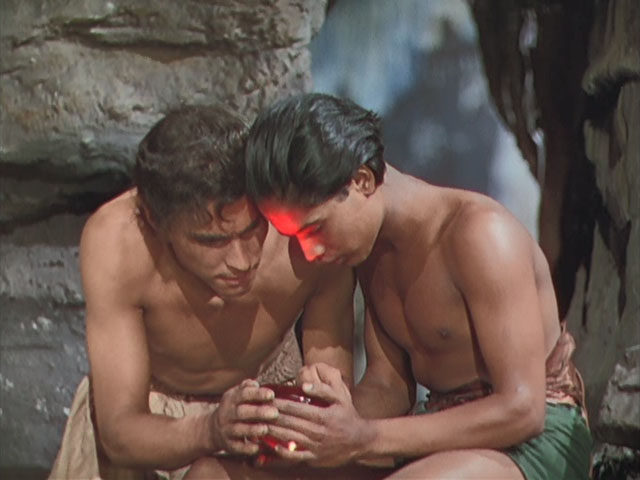
22. Abu shows Ahmad the princess
Jaffar is watching the princess approach the "Blue Rose of Forgetfulness."
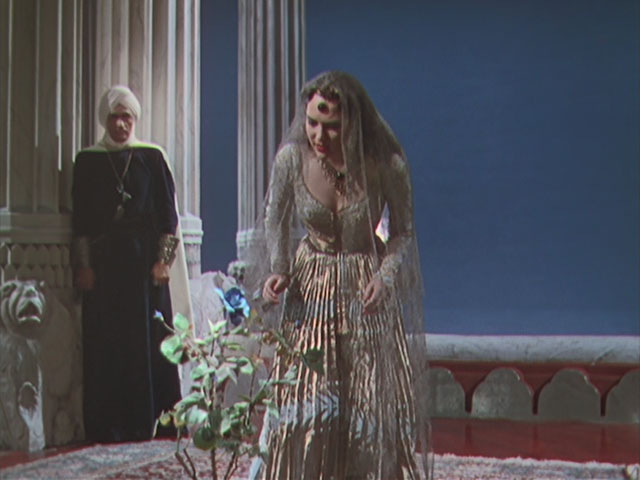
23. The princess and the rose
Abu and Ahmad argue and Abu wishes him to Baghdad which the Djinn accomplishes.
The third wish completed, the Djinn flies off.
Abu throws the Eye down a cliff where it explodes and sends Abu to the "Land of Legend."
There the king gives Abu a magical crossbow.
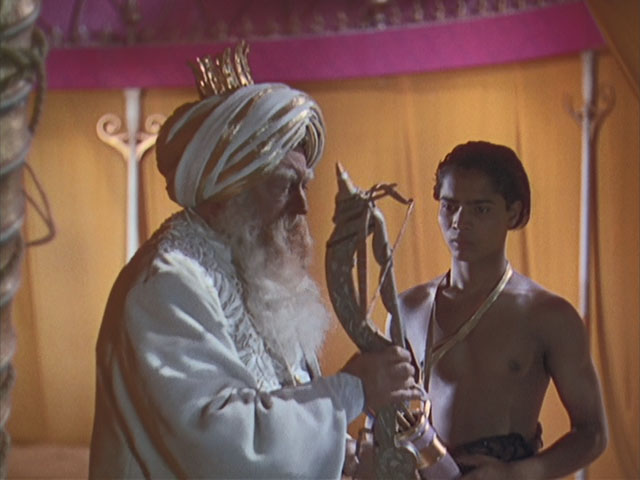
24. The Old King gives Abu the crossbow
The king also mentions a magical flying carpet which Abu "steals."
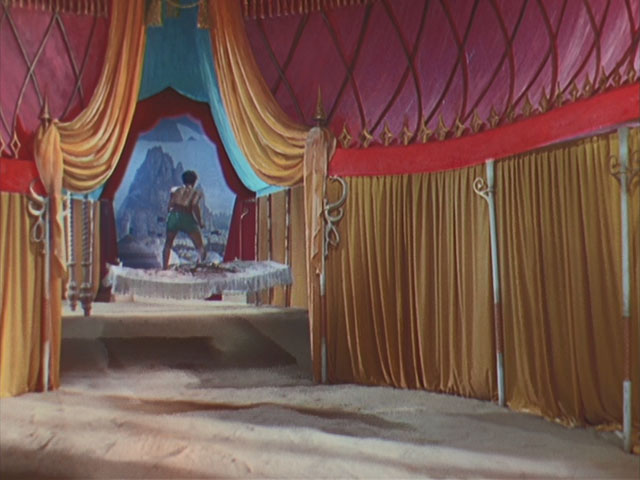
25. Abu takes off
Abu arrives in Baghdad where Jaffar, having given up on the princess, is staging a
public execution of Ahmad. Abu rescues Ahmad from the executioner and they fly to the palace.
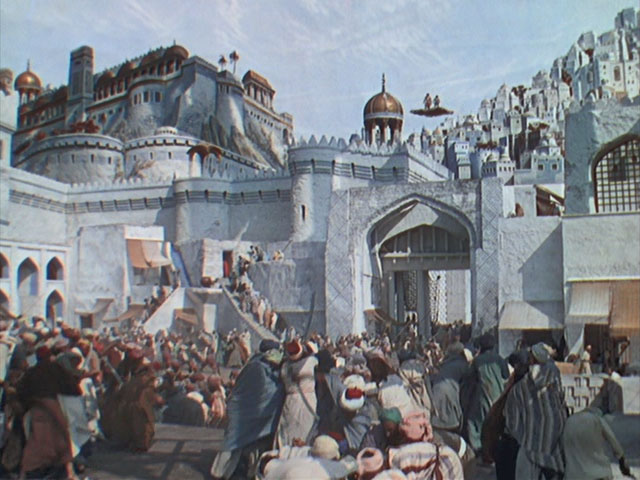
26. Abu and Ahmad riding to the palace
Jaffar sees them coming and decides to leave.
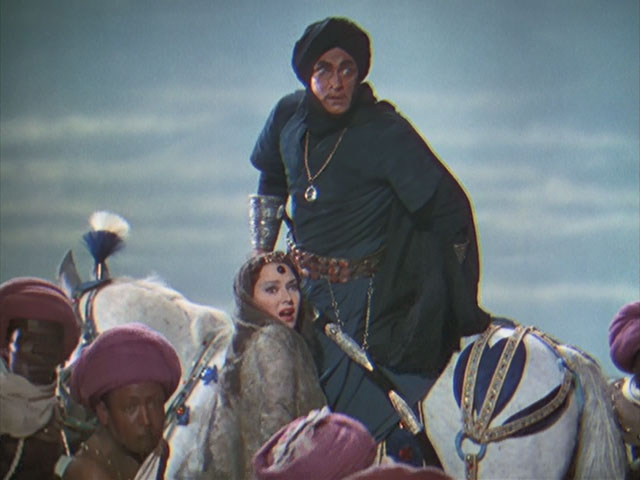
27. Jaffar flees
Abu uses his crossbow to shoot and kill Jaffar, leaving Ahmad the rightful king.
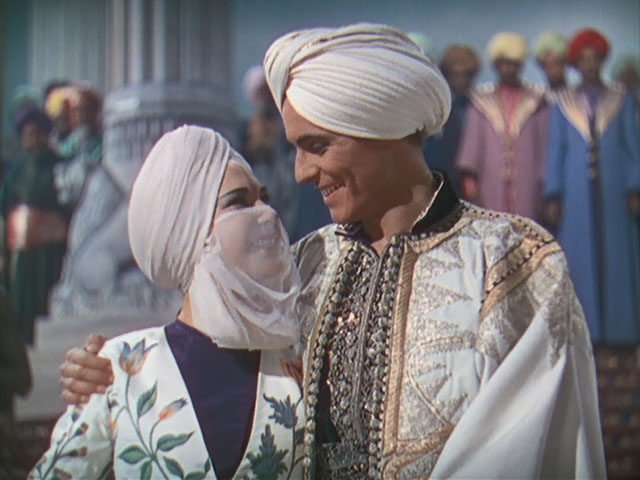
28. Prince and princess together
Prince Ahmad announces that he is going to send Abu to school with the predictable result.

29. Abu heading somewhere over the rainbow
Now I'm going to find what I want. Some fun and adventure at last!
Cast, Directors, Writers:
Sabu as Abu
John Justin as Ahmad
Conrad Veidt as Jaffar
Rex Ingram as the Djinn
June Duprez as the Princess
Miles Malleson as the Sultan of Basra
Directors: Ludwig Berger, Michael Powell, Tim Whelan
Writers: Miles Malleson, Lajos Biro, Miklos Rozsa
John Justin as Ahmad
Conrad Veidt as Jaffar
Rex Ingram as the Djinn
June Duprez as the Princess
Miles Malleson as the Sultan of Basra
Writers: Miles Malleson, Lajos Biro, Miklos Rozsa
| Prev | Back | Next |